- About Us
- Columns
- Letters
- Cartoons
- The Udder Limits
- Archives
- Ezy Reading Archive
- 2024 Cud Archives
- 2023 Cud Archives
- 2022 Cud Archives
- 2021 Cud Archives
- 2020 Cud Archives
- 2015-2019
- 2010-2014
- 2004-2009
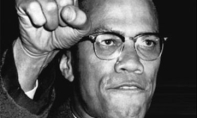 |
The Legacy That Lives On- Malcolm X |
With Barack Obama now the first black man in American history to secure the nomination of a major party for President, it seems timely to look back on another noted leader who, though unconventional — and in many people’s view would have been wholly unelectable — was and remains, nonetheless, a hero in the black community and beyond. This man is, of course, the civil rights activist of the 1960’s, Malcolm X.
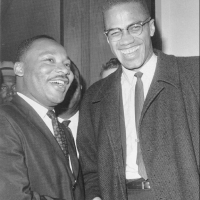 In contrast to his most noted contemporary civil rights activist, Martin Luther King, Malcolm X was often frowned for his violent and aggressive rhetoric directed against whites and racists alike, and for his slogan that at times divided Americans in its interpretation — "By any means necessary!" Despite widespread support Malcolm X also had his enemies, and within a few years of his emergence onto the national spotlight he was assassinated by a group to whom he had once been closely aligned — the Nation of Islam.
In contrast to his most noted contemporary civil rights activist, Martin Luther King, Malcolm X was often frowned for his violent and aggressive rhetoric directed against whites and racists alike, and for his slogan that at times divided Americans in its interpretation — "By any means necessary!" Despite widespread support Malcolm X also had his enemies, and within a few years of his emergence onto the national spotlight he was assassinated by a group to whom he had once been closely aligned — the Nation of Islam.
Many reasons exist in explaining why such a man remains a nationalist hero for African Americans, and perhaps the most important is related to his impoverished, troubled beginnings. In a world where one third of black Americans live below the poverty line, and where so many black youths find themselves entangled in crime and drug problems, Malcolm X spoke aggressively of ambition, aspiration and a mobility toward success that is still empowering to this day.
Born Malcolm Little in Omaha, Nebraska in 1925, Malcolm X was the son of a Baptist minister, Earl Little, who while encouraging equal rights for blacks and subjected to attacks from the Ku Klux Klan for his views, was also abusive domestically to his wife and children before dying still a relatively young man. Malcolm's mother struggled to support her eight children and ended up in a mental hospital. With no parents to care for him, Malcolm passed in and out of reform schools and foster homes, and emerged a tough young man nicknamed "Detroit Red" because of the reddish crop of hair that he styled slicked back. Malcolm slid into a world of gambling, burglary, pimping and drug dealing, finally landing in jail where his inmates referred to him as "Satan".
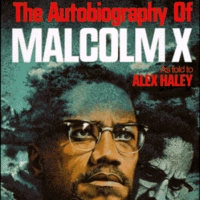 It was here in jail that a transformation took place in Malcolm. He used the time to educate himself, first teaching himself to read, then studying literature, history, philosophy and religion. It was through his studies that he also came across the Nation of Islam, labeled by many as "the natural religion for the black man". Elijah Muhammad, the leader of this American brand of Islam, taught that the original inhabitants of the earth were black, and that because of his treatment of other races throughout history, "the white man is the devil". Elijah encouraged racial separation, clean living and self-discipline.
It was here in jail that a transformation took place in Malcolm. He used the time to educate himself, first teaching himself to read, then studying literature, history, philosophy and religion. It was through his studies that he also came across the Nation of Islam, labeled by many as "the natural religion for the black man". Elijah Muhammad, the leader of this American brand of Islam, taught that the original inhabitants of the earth were black, and that because of his treatment of other races throughout history, "the white man is the devil". Elijah encouraged racial separation, clean living and self-discipline.
Malcolm was so intrigued by the religion, that on his release from prison he became a minister for the religion and set up three mosques in New York. He dropped his "slave name" of Little, and replaced it with an "X" that stood for his lost African name and heritage. Before long Malcolm X's charismatic speeches and words of wisdom became heard throughout New York, and he was reported by the New York Times to be the second most sought after speaker (after Senator Barry Goldwater) at universities and colleges, despite such forceful dialogue as — "Think of how it was on your slave foreparents' bloody, sweaty backs that (the white man) built this empire that's today the richest of all nations — where his evil and his greed cause him to be hated around the world!"
Malcolm provided a strong example of purity to other African Americans. He did not drink or smoke, and his marriage to a young black woman, Betty X, resulted in four daughters and strict monogamy. He encouraged blacks to " … get rid of drunkenness, drug addition, prostitution".
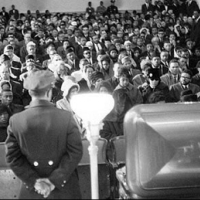 For those who supported and knew Malcolm X well, it was no surprise that by 1963 Elijah Mohammad, slowed by illness, had announced Malcolm, the Nation of Islam's first national minister. On John F. Kennedy's assassination Malcolm observed, "The chickens are coming home to roost," and for this attack on a country still in mourning Elijah silenced him for 90 days. It was during this time that he began to question his allegiance to Elijah. He learnt of corruption within the religion and received threats on his life from within the organization.
For those who supported and knew Malcolm X well, it was no surprise that by 1963 Elijah Mohammad, slowed by illness, had announced Malcolm, the Nation of Islam's first national minister. On John F. Kennedy's assassination Malcolm observed, "The chickens are coming home to roost," and for this attack on a country still in mourning Elijah silenced him for 90 days. It was during this time that he began to question his allegiance to Elijah. He learnt of corruption within the religion and received threats on his life from within the organization.
Consequently, in the last few months before his death, Malcolm X undertook further change. Separating from the Nation of Islam, Malcolm went on a pilgrimage to Mecca, he renamed himself El-Haji Malik El-Shabazz, and on his return to America showed a softer attitude towards whites. He established the organization of Afro-American Unity, yet still maintained, "I firmly believe that Negroes have the right to fight against racists by any means that are necessary."
With his new beliefs and policies Malcolm gathered further support, particularly from the white population. On February 21, 1965, as he prepared to address a crowd in Harlem he was shot 16 times and killed by three men from the Nation of Islam. After his death he remained a motivator and spiritual, martyr leader for many black and white groups alike.
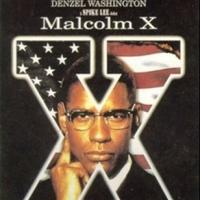 Unable to exist and represent himself as he wishes, however, individuals have, as with any noted figure in history, been able to depict and interpret Malcolm as they wish. This has had negative results not just from detractors of Malcolm X, but even some of those supporters whose extreme views are an inaccurate assessment of the ideology he held at the time of his death.
Unable to exist and represent himself as he wishes, however, individuals have, as with any noted figure in history, been able to depict and interpret Malcolm as they wish. This has had negative results not just from detractors of Malcolm X, but even some of those supporters whose extreme views are an inaccurate assessment of the ideology he held at the time of his death.
In popular culture throughout the 1990’s and into today Malcolm X lives on. Spike Lee’s 1992 biographical movie starring Denzel Washington especially peaked interest in the public, but this has been true in other forums as well like hip hop music, Malcolm X merchandising and sales of Alex Haley’s The Autobiography of Malcolm X, which has reached into the millions worldwide. In the political arena, the oft-controversial figures Jesse Jackson and Louis Farrakhan of the Nation of Islam have continued to encourage support of the activist.
What is clear is this — as long as racial tension and struggle exists, the popularity, importance and relevance of Malcolm X will remain and his words will always continue to provide valuable lessons in inter-racial relations. Perhaps Alex Haley, in his foreword to Malcolm X's autobiography described best the appeal of this young, outspoken man from the streets: " … he was the most electric personality I ever met, and I still can't quite conceive him dead. It still feels to me as if he has just gone into some next chapter, to be written by historians."
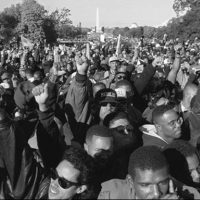 A revival of interest in Malcolm X invariably has positive results. The preacher's later speeches made clear to both whites and blacks alike the need for greater unity between the races. Many supporters of the man say that whilst Martin Luther King stated racism can "destroy the personality and scar the soul", Malcolm X cried, "By any means necessary," and made clear that the only solution to racism, bigotry and inequality is action. While it is a practical reality of politics and mass appeal that it is unlikely we’d ever hear Barack Obama campaigning today on the strength of quotes attributed to an as still potentially volatile personality as Malcolm X, it is undeniable that Obama’s demands for change, civic action, and the rally cry of ‘Yes We Can!’ are rooted in the legacy of the civil rights movement and the work of individuals like Malcolm X.
A revival of interest in Malcolm X invariably has positive results. The preacher's later speeches made clear to both whites and blacks alike the need for greater unity between the races. Many supporters of the man say that whilst Martin Luther King stated racism can "destroy the personality and scar the soul", Malcolm X cried, "By any means necessary," and made clear that the only solution to racism, bigotry and inequality is action. While it is a practical reality of politics and mass appeal that it is unlikely we’d ever hear Barack Obama campaigning today on the strength of quotes attributed to an as still potentially volatile personality as Malcolm X, it is undeniable that Obama’s demands for change, civic action, and the rally cry of ‘Yes We Can!’ are rooted in the legacy of the civil rights movement and the work of individuals like Malcolm X.
